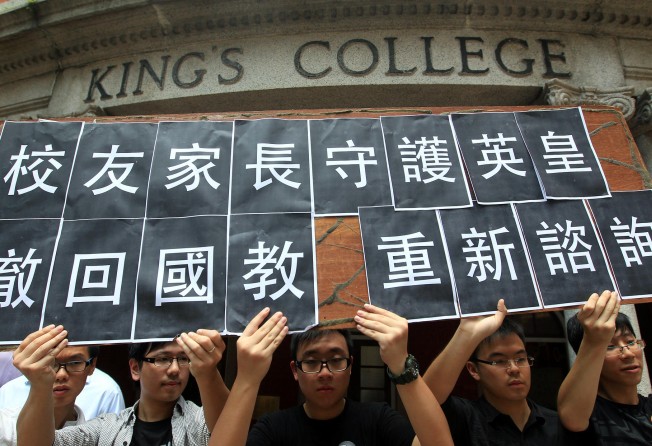National education curriculum guide to drop references to 'modern China'
After chief executive's climbdown on national education, references in 'contemporary' section will be deleted from a new curriculum guide

The Education Bureau is cutting references to contemporary China from its curriculum guide on the national education subject, it said yesterday.
The announcement came two days after Chief Executive Leung Chun-ying scrapped the three-year deadline for implementing the controversial subject, amid loud public protests.
He said that schools would be free to choose for themselves whether to teach it.
Yesterday a bureau spokeswoman said: "[The government] will withdraw … and seriously review the sections in the curriculum guide that have caused controversies, such as assessments of students' passion [towards the country]."
Sections about Chinese culture, heritage and landscape will remain in the guidelines, the bureau said.
The original curriculum guide called for students to observe appropriate etiquette for a national flag-raising ceremony, to know the workings of government bodies and the names of leaders under the sections on contemporary China.
Assessing students on these topics - such as gauging their emotional feelings towards the country - had already been removed from the guide.
A new guide will be compiled by the Curriculum Development Council after consultations with a committee set up in the wake of protests against the subject.
The push for the introduction of national education led to street rallies, protests outside schools that planned to adopt the subject and a massive sit-in outside the government headquarters in Admiralty.
It created a major crisis for Leung's administration.
Leung's announcement on Saturday failed to satisfy all protesters, with some calling it an exercise in political expediency to appease the public.
Some said the government could still put pressure on public schools to adopt the subject through its subsidy levels and through their sponsoring bodies.
Many opponents of the subject, including some who have refused to leave the sit-in area at the Tamar site, have asked the government to withdraw the subject completely.
Yesterday, a group of alumni of King's College - the chief executive's alma mater - met the principal to express their concern that the government school may be forced to adopt the subject despite Leung's about-face.
Wong Hon-kam, chairman of the Union of Government School Teachers, said schools have weak bargaining power, especially those that are directly under the government.
He called on officials to clarify the administration's latest position on introducing national education in government schools.
The Alliance Against National Education said the protest campaign, which forced the government to back down, proved that the city had a strong civic society.
"The issue woke up many people in the city, to realise that they should participate more in current affairs," Andrew Shum Wai-nam, an alliance spokesman, said yesterday.
The alliance, he said, would now help parents monitor the implementation of national education at the school level, to ensure that students get a balanced, well-rounded view of China.